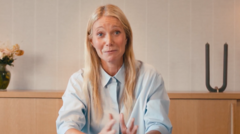Many women are seeking help online for PCOS, often falling prey to unqualified influencers selling ineffective remedies and dietary plans. Experts warn that this misinformation can worsen health conditions and delay proper medical treatment.
The Rise of Health Influencers Selling Dubious PCOS Solutions

The Rise of Health Influencers Selling Dubious PCOS Solutions
Women with polycystic ovary syndrome (PCOS) are turning to influencers promising unproven treatments, raising alarms over the spread of health misinformation online.
In an alarming trend, unqualified influencers are marketing questionable remedies for polycystic ovary syndrome (PCOS), preying on women seeking solutions for a condition that affects approximately one in ten women globally. Sophie, who suffered from painful periods, weight gain, and depression due to PCOS, ultimately turned to Kourtney Simmang, an influencer she discovered on Instagram, for help. Promising to address the "root cause" of PCOS—a concept yet to be defined by medical research—Simmang offered a comprehensive package of tests, dietary plans, and supplements for nearly $3,600 (£2,800).
Despite spending considerable money on additional supplements suggested via affiliate links, Sophie did not see any improvement in her symptoms after almost a year. “I left the programme with a worse relationship to my body and food,” she lamented. Kourtney Simmang did not respond to requests for comment.
Alarmingly, a trend has emerged where influencers, often lacking proper medical qualifications, exploit the gap in effective medical solutions for managing PCOS. Many influencers have garnered large followings and may falsely present themselves as nutritionists or "hormone coaches." The BBC reported that videos tagged with “PCOS” on TikTok and Instagram frequently promote misinformation, with around half containing misleading claims.
A vast number of women with PCOS remain undiagnosed, and those who do have a diagnosis often face challenges in finding effective treatment. Dr. Jen Gunter, a prominent gynecologist, points out that “whenever there’s a gap in medicine, predators take advantage.” Misleading assertions include claims that PCOS can be “cured” through diet alone, and that commonly prescribed medications, such as birth control pills, exacerbate symptoms—claims that contradict current medical findings.
Despite efforts from platforms like TikTok and Meta to regulate health misinformation, many unverified accounts continue to thrive. Popular influencers, such as Tallene Hacatoryan, advocate self-treatment options including expensive supplements and restrictive diets, stating that mainstream medications can hinder natural healing. Followers like Amy have responded to this advice, often finding themselves in distressing cycles of failure and dissatisfaction, exacerbating eating disorders in an already vulnerable group.
In Nigeria, medical student Medlyn is taking steps to dismantle the stigma surrounding PCOS, urging women to seek reliable medical advice and embrace treatments backed by science. She emphasizes the emotional toll that societal views about PCOS can take on women, often affecting their self-worth and relationships.
Dr. Gunter highlights the importance of seeking specialized medical help for individuals struggling with PCOS. Through awareness and advocacy, experts hope to steer women away from ineffective influencer-led solutions and guide them toward comprehensive medical care. As Sophie and her doctors continue to explore treatment options, the situation stands as a vital reminder of the ongoing battle against health misinformation in the age of social media.


















